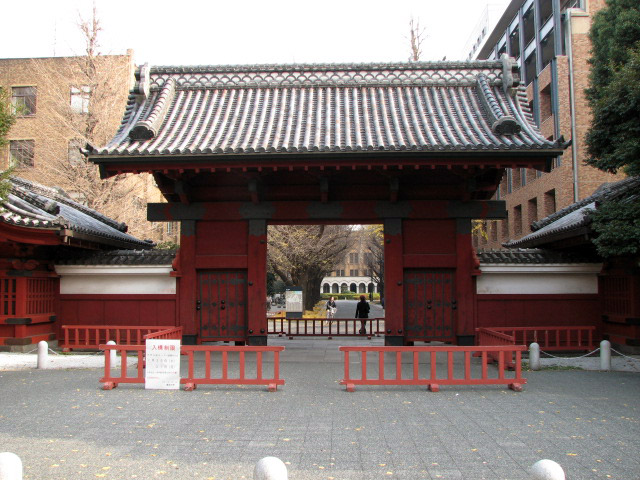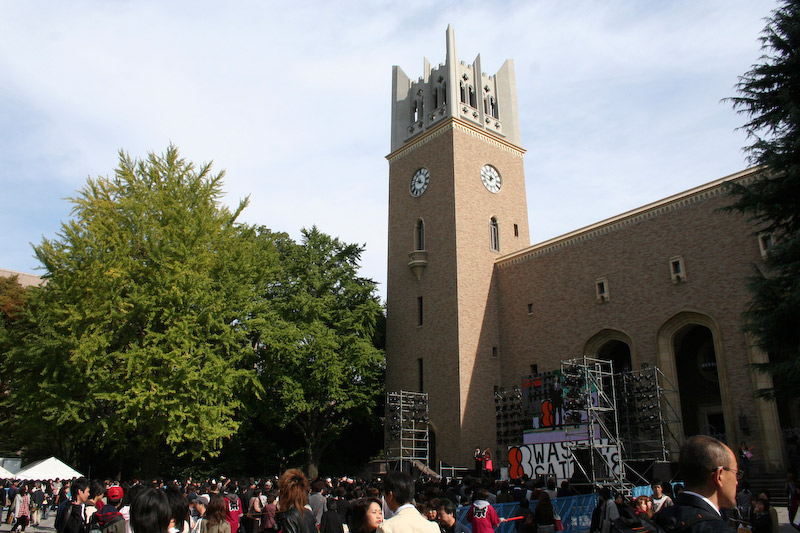I get the feeling that lots of the readership here at Tofugu may be thinking about college choices, pondering over exchange programs or even thinking about grad school. So, I decided to do a little series about college in Japan, starting from this article. First up: why you should seriously consider coming over to Japan for college.
The Reasons

Now, going overseas for college or for an exchange is widely considered to be a good thing – for your resume, for your worldly knowledge, or even for your plain and simple enjoyment.
The question then is: "why Japan?" Obviously if you're doing a Japanese Studies major or have a very strong interest in Japanese stuff like many of the writers on this blog, the reasons are obvious. But for those who are wavering between Japan or another country, or those still a bit unsure, here are some reasons for your consideration.
1. It really isn't that expensive

Lots of people probably have heard that Japan is ridiculously expensive – pointing out the many "Most Expensive Cities in the World to Live In" in which Tokyo and Osaka often rank near the top.
The first thing to note is that such surveys often measure the cost of a working expat. Thus the cost of renting an apartment and a car is often factored in. Obviously, as a student you probably aren't aiming to own your own car in Japan and if you're in a hostel the rent is significantly lowered. Plus, if you're from North America or Western Europe, you'll find the typical 500 yen meals fairly cheap. Think about eating out every meal for about 5 US dollars/3 pounds/4 euros. And there's no tipping too. Nonetheless things (and especially fruits!) may look expensive if you're not from the above areas though.
If you're thinking of spending your whole college life in Japan, tuition is also relatively cheap. For example (the information below is from the official websites), the University of Tokyo's annual tuition fee is ¥585,800 or about 5,400 US dollars. Private universities tend to be a bit more expensive with Waseda's School of International Liberal Studies' school fees near ¥1,500,000 or near 15,000 US dollars a year. While this may be expensive for someone who comes from a country with no tuition fees, it certainly does not reach say, US college fees.
In addition (and which will be covered in a later article), scholarships for both exchange students and full time students are quite common in Japan. Many foreign students in Japan under them have a large part (if not all) of their living expenses etc. covered.
2. You will (be forced to) learn a different language

But can't you learn the language without going to Japan? Well, yes, somewhat, but there's a whole new depth to things when you have to live in a different language. For example, very few textbooks are going to teach you what an onion is in Japanese – tamanegi. And certainly none of them are going to tell you what the kanji (玉葱) are. But going to a supermarket in Japan and puzzling over what the things are is in itself a very big opportunity to learn Japanese.
Basically, no one is going to look at you and say "oh this person is at so-and-so level of Japanese and so let's make the kanji easier for him." – the level of immersion quite simply is different.
No guarantees though – some people come and don't put in the effort to learn so it's no surprise that they go back with a poor grasp of the language, stopping at somewhere between "konnichiwa" and "sayonara."
3. You (probably) won't need to study hard
This does depend on the university. But generally, if there's one thing that Japanese universities are not known for, it is academic vigor. So, if you come to Japan hoping for deep discussions with the Japanese students about Japanese philosophy or some probing into the problems of Japanese society with great academic depth you will most likely be disappointed.
This is because firstly, the Japanese students don't really take college that seriously. After all – as someone once told me before, in Japan "college is the spring break of life." (more on this in a later article) In addition, if you're here on an exchange program or a degree course in English, well, let's just say that much of the teaching staff doing the courses aren't really fluent in English.
But on the other hand, generally speaking you'll have enough time to travel or do whatever you want. So if you're looking to have a relaxed time or if you subscribe to the mentality that "the real learning happens outside the classroom", this can be an opportunity in itself.
4. But you will learn nonetheless

And I don't mean just the language.
This is because Japan as a society is just really different. Even to other Asians, it is just really different.
It is precisely because it is so different that you may oddly learn more about your home country after coming to Japan – for the simple reason that living in Japan will offer you a basis for comparison by which you can judge your home country.
And of course, you'll learn about Japan first-hand. No matter how much someone reads this blog or any other website on Japan, the fact is that we can only provide a limited view of Japan colored by our respective biases. Nothing beats, and nothing can beat, experiencing Japan first hand with its ups-and-downs.
You'll also probably learn more about yourself. If you've never lived alone before you'll have to learn. If you have never lived in another country before you'll experience the culture shock and learn to question all the assumptions that you had about life. Like, how you would think that ATMs, being machines, do not need rest (they apparently do in Japan).
5. Better to do it while you're a student
I'll be honest here. Japan isn't for everyone. Every year lots of foreigners come to Japan to work not knowing a single thing about Japan and expecting paradise. If they like it – then all's well, but for a significant proportion of people it ends up being an entirely different experience.
The good thing about coming as a college student is that because it is "the spring break of life", you have time to observe, listen to stories from people currently working in Japan, and then make a decision on whether or not staying in Japan for the long term is for you.
You certainly wouldn't want to be in the situation which many foreigners working in Japan find themselves in. More precisely, one where you come to Japan having a distorted view of it, find out that it isn't what you expected and then are faced with the dilemma of enduring or going home and having to do the job search all over again.
And to end off…

Perhaps one big reason for why you should come to Japan is that Japan needs you. At the moment the whole of Japan is captivated by this idea of "internationalization" ( 国際化). In short, having largely not been that accepting of foreign input, many Japanese companies and perhaps Japan's society as a whole have been coming under intense pressure from foreign competition.
Japan is thus starting to realize that it needs to accept more diversity and allow for a wider range of viewpoints. Due to this, Japan is facing the challenge of bringing in more foreigners as employees, researchers and of course as students.
How effective Japan's attempts at "internationalization" are is up for debate, but what is also true is that in the universities right now, there are too few international students for there to be any effective "internationalization".
Obviously the problem is deeper than that – the culture of homogeneity needs to be addressed too – but Japan still needs you here to give it some international stimulation. So, I hope that this article has given you some information to think over – and who knows? Maybe I'll see you studying around in Japan soon!
Update:
Hey people, I think I've been a bit unclear and misleading with the title. Basically, while I do indeed hope that some people will come for the full four years for college, this article also applies to people who are thinking of study-abroad programs. The next article will tackle directly the idea of Japan's universities being spring breaks of life so I hope to address that too.
